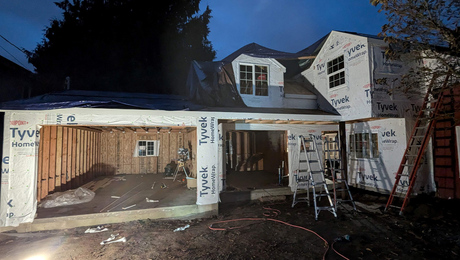We are getting ready to have a ground source heat pump installed in a few weeks. One contractor has mentioned a U V light filter. I haven’t found a whole lot of independent info on the net. The places that sell them of course, tell you you can’t live with out them, and the places that are pushing pleated, electrostatic or ozone filters all say the same thing about their product. I am interested in any opinion concerning UV filtration and its advantages/disadvantages to other systems.
Discussion Forum
Discussion Forum
Up Next
Video Shorts
Featured Story

The FHB Podcast crew takes a closer look at an interesting roof.
Highlights
"I have learned so much thanks to the searchable articles on the FHB website. I can confidently say that I expect to be a life-long subscriber." - M.K.














Replies
I can only offer this, when I worked at an HVAC supply house on 01, we had them but we really didnt sell many at all.
That was 6 years ago but I know back then it was just another display to dust.
If you want local info, i'd go to a supply house and ask them. They sell all kinds of filtering devices so I would think they'd be honest with you.
Family.....They're always there when they need you.
Never heard of UV filtration but I have herd of it as a treatment for killing bugs in water systems. I don't quite understand how UV is going to "filter" anything out it just kills bacteria etc. within the air stream and I doubt it would be able to do it effectively in the rapid air stream.
Stay away from anything that generates ozone regardless of what a salesman/women tells you.
Agree on that: every molecule of ozone you breathe does you damage. Breathing any of it voluntarily is idiotic.
UV will kill the bugs that blow by, provided they're not shielded by the dust they're living on. But why bother? Filter the air and get rid of the dust and spores etc. The microorganisms are going to be in the air as long as there are humans in the house.
Tend to agree w/ woodway. UV filters are for microbes, not particulates. You'd still need to filter dust, I would think.
If you think you need to 'filter' or kill microbes in the air, my reaction is ... you got big problems. I'd approach very skeptical ... read more about them and what they do. Call the manuf. tech rep and ask them the tough questions and don't settle for half answers. DON'T rely on local HVAC guys ... no offense to them, but they will only tell you what they know and what they are familiar with (as a general rule) and often, that really isn't objective, knowlegeable information ... it is biased. Doesn't hurt to ask around, but certainly don't just stop w/ one guy's opinion. ... 'course that is why you are here, isn't it?
If you have a need to do real serious dust filtering you can do things like HEPA or electrostatic filters ... but look at your house first .... will you be doing a lot of work for little benefit? If you have a medical type condition that is one thing, but there is a lot of dust generation in an average house that is difficult to control (e.g. just going in and out of the door).
For general house applications, I think a nice 2 inch pleated filter works well (IMO). You can preceed it by a standard cheapy to filter the big stuff, but the pleated filters are relatively inexpensive. I had my sheet metal guy fabricate a filter holder for one when I installed a new furnace once. Small price to pay for good filtering.
Like most of the other alluded to, UV Lights are not filters. They work by killing microscopic organism that will gorw on wet cooiling coils and slightly increase the fouling of that coil. In very large commercial operations, the reduction in maintenance anfd the interim pressure increases across fouled coils and the cost of fan power make UV lights in large commercial air handlers a reasonable value with good payback on investment. In a small commercial application and in residential systems, the value of UV light treatment is nil. Do not waste your money.
I wholeheartedly concur that good mechanical filtration is by far the best, most efficient and cost effiective way to treat the air in your home. Filters are rated in many ways, MERV being the most common, industry standard. Get a pleated filter with a MERV rating of 7 or greater. Personally, I like the Honeywell and AprilAire media filters. Honeywell offers greater flexibility in the filter elements available for the system.